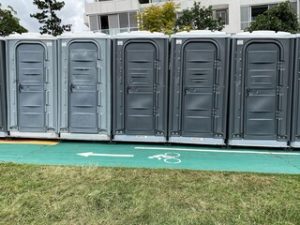Providing guests with adequate portable restroom facilities is one of the most important aspects of an event or construction project. Choosing the right unit type and quantity based on expected attendance will help keep costs down.

To maximize savings, compare quotes and opt for standard units if your event or work site doesn’t require ADA-compliant models. Bundled services may also provide discounts. Contact Port A Potty Rental for more details.
The cost of a potty rental can vary widely, depending on the type of unit you choose. If you are looking for a basic, standard porta potty for a short event, expect to pay between $100 and $200 per day. Higher-end units, such as bathroom trailers, can cost significantly more. Choosing a company that offers multiple unit types and sizes will help you find the best price for your event.
The number of portable toilets you need will also influence the cost. If you are planning a large event, it is recommended to rent at least a few units for every hundred guests. This will prevent a line and provide sufficient restroom space for everyone attending the event. You should also consider the amount of time you plan to have the rentals in place. If you will need the units for a longer period, look into weekly or monthly rates. These will be cheaper than daily rates and often include one cleaning service each week.
In addition to the cost of the portable toilets themselves, you will need to factor in the delivery and setup fees. These are charged by the rental company for bringing the unit to your location and setting it up. They can also include additional charges for sanitizing the units and disposing of the waste. Ask the company for a detailed breakdown of the rental costs to avoid surprises when you receive your bill.
Some companies may charge extra for a weekend rental or for bringing the units to a remote location. They might also charge a late fee if the unit isn’t picked up on the scheduled pick-up date. You should also consider the price of a holding tank rental for your event if you do not have sewer line access.
Most rental companies offer a variety of portable toilets and are capable of providing different types to accommodate your needs. In some cases, they can even handle specialized requests for high-rise construction sites. Ask about ADA-compliant ports for workers with disabilities, for instance. The best way to save on porta potty rental is to book in advance. By booking early, you can lock in better prices and ensure that the units you want will be available for your special event or long-term construction project.
Types
When it comes to renting portable toilets for an event or work site, there are a variety of options available. From basic standard porta potties to luxury restroom trailers, each option offers a different level of comfort and sanitation. Understanding the differences between these types can help hosts and workers make the best decision for their needs.
The number of guests or workers attending an event or working on a construction project can influence the type and number of portable toilets needed. A good rule of thumb is to rent one porta potty for every 50 attendees or workers. This helps ensure that everyone has access to a toilet and can avoid long lines and unsanitary conditions.
A reputable porta potty rental company will provide cleaning and maintenance services for their units. This is especially important for extended events or construction sites. The type of unit and the location of the site can also impact cleanliness and maintenance standards. For example, high-rise construction sites may require specially designed units that can be lifted by cranes. It’s important to discuss these details with your rental provider before finalizing your rental.
Different events or projects have distinct requirements for toilet facilities. For instance, a wedding may require more private toilet stalls than a construction site would. To meet these requirements, a host can rent high-end porta potties with locking stalls and individual sinks. These rentals are ideal for high-profile events where privacy is essential and can be more cost-effective than traditional units.
In addition to stalls and sinks, luxury portable toilets also offer amenities like handwashing stations and climate control. These extras can improve the comfort of guests and increase productivity on a construction site. In addition, some rental providers will provide on-site support staff to manage and maintain the portable toilets throughout an event or project.
Before you select a portable toilet rental, make sure you understand the cost structure and any added value services. Ask about delivery fees, pickup charges, and servicing rates before making your final selection. This will help you avoid hidden costs and keep your budget under control. It’s also a good idea to choose a local company that can deliver and service the portable toilets quickly and effectively.
Amenities
A portable toilet is a necessity for people who enjoy outdoor activities. Whether they’re hosting a family picnic in Flushing Meadows or going upstate for some camping, New York residents know that it’s important to have access to clean and reliable restroom facilities. Many rental companies in the Big Apple offer a wide range of portable toilets to suit all needs.
Some portable toilet rental companies also provide expert advisory services, helping clients to determine the type and number of units needed for their event or construction site. These professionals can advise on the number of guests expected, the type of activity, and other unique requirements of each client. This will help them make appropriate recommendations that will ensure a comfortable and sanitary experience for all guests.
Porta potties are typically cleaned with sanitizing solutions on a regular basis. Some companies use hospital-grade sanitizers, which helps to keep them fresh and clean for the duration of the rental. These sanitizers are a safe alternative to traditional soap, and they don’t harm the environment or leave a toxic residue behind. Using these sanitizers also helps to eliminate odors and ensure a more pleasant restroom experience for your guests.
In addition to sanitizers, portable toilet rentals also offer a variety of other amenities to enhance the comfort of your guests. For example, they can come with a hand washing station that includes a sink and faucet. They can also include a paper towel dispenser and dispensers for soap, lotion, and detergent. Some models also have a HEADLINER toilet seat cover and HEADMIST timed-release air freshener.
Another advantage of using portable restrooms for events is that they can be placed in a variety of locations. This includes parks and beaches, which are popular for outdoor celebrations, weddings, and other special occasions. In Huntington, NY, for example, there are several parks and beaches where guests can enjoy a variety of fun outdoor activities.
Luxury portable toilets are particularly useful for upscale events such as weddings and premium construction projects. They can be equipped with private stalls, locking doors, and other features to make the restroom more appealing for guests. In addition to providing guests with a higher level of service, this added privacy can help them relax and enjoy the event more fully. It can also reduce stress levels by reducing the number of interactions that must be made.
Maintenance
The cost of a porta potty rental isn’t just the initial price; there are also costs associated with routine maintenance and cleaning. These costs are important to consider when evaluating the cost of portable toilet rentals for an event or business. In addition to maintaining hygiene standards, it is important to inspect the units regularly for damage or wear-and-tear. This can help avoid costly repairs later on.
For example, if the unit is damaged by vandalism, it will require repair or replacement. This can be expensive, especially if it happens on a regular basis, and it can also cause operational disruptions. It is therefore a good idea to invest in damage insurance coverage, which will cover the costs of any damages caused by vandalism or other unforeseen events.
Depending on the length of rental and the number of portable toilets needed, there may be additional fees that need to be considered. These include delivery and set-up fees, waste handling fees, and cleaning and maintenance costs. The latter typically includes emptying the waste tanks, restocking supplies, and thoroughly cleaning the portable restrooms between uses. These fees are not always included in the initial quote, so be sure to ask about them before finalizing your rental agreement.
Some rental companies charge a premium for the use of their units during certain peak seasons, such as summer and holidays. This fee is a result of the increased demand and limited availability for these types of units. If you are planning a large event or need to rent porta potties for a long period, it is best to book early.
Other potential rental expenses include the need for a permit, fuel surcharges, and a premium charge for weekend or rush deliveries. Additionally, some rental companies may require a deposit to secure the equipment and/or an extra cleaning fee. Finally, it is important to know that the cost of a portable toilet can increase if you choose a high-end model with features such as handwashing stations or heating for colder weather. These amenities are often optional, but they can be essential to the comfort of your guests or patrons.
